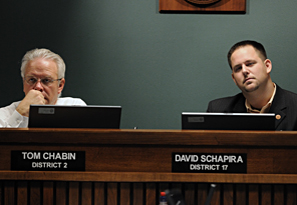Lawmakers scrutinize STOs, seeking reform
Luige del Puerto//September 21, 2009//[read_meter]
 A group of lawmakers are taking a closer look at a program that gives income-tax breaks to people who donate money for private school scholarships.A Sept. 21 hearing on school-tuition organizations at the state Capitol came on the heels of newspapers reports that highlighted ways the tax-credit program could be abused. The hearing showed a reinvigorated interest among lawmakers to scrutinize the program after years of seemingly little oversight.
A group of lawmakers are taking a closer look at a program that gives income-tax breaks to people who donate money for private school scholarships.A Sept. 21 hearing on school-tuition organizations at the state Capitol came on the heels of newspapers reports that highlighted ways the tax-credit program could be abused. The hearing showed a reinvigorated interest among lawmakers to scrutinize the program after years of seemingly little oversight.
But Rep. David Schapira, a Democrat from Tempe who chairs the panel, made it clear immediately that the minority-led task force does not intend to eliminate school-tuition organizations.
“If you have been informed that the intent of the task force is to eliminate STOs, you have been misinformed,” Schapira said.
The task force’s members appear to agree on the need for reform, especially in the area of making the program more transparent.
“This is a worthy program. Let us tighten it up, make sure it works,” said Rep. Rich Crandall, a Republican from Mesa.
Even though Democrats intended for the panel to be bipartisan, Crandall was the only Republican who showed up. Rep. Doris Goodale, a Republican from Kingman, and Rep. Steve Court, a Republican from Mesa, were invited and were supposed to participate in the hearing.
Under state law, individuals and corporations can donate money to school-tuition organizations, which then give scholarships or tuition grants to students who want to attend private schools.
Critics have complained that the program siphons money from the public educational system and lacks proper oversight and accountability.
But supporters have argued it provides more options for parents who want to send their children to private schools, saves the state money and allows students who have specific needs to go to private schools that address those needs.
Recent investigations by the East Valley Tribune and the Arizona Republic questioned the practices of school-tuition organizations. The task force chaired by Schapira is one of two panels that have been formed in response.
Dr. Larry Mohrweis, an accounting professor from Northern Arizona University, suggested applying the existing guidelines of corporate income-tax credits to individual income-tax credits to address some of the problems.
For example, when school-tuition organizations receive contributions from corporations, they are required to allocate 90 percent of those contributions to students who qualify for free and reduced lunch under the federal school-lunch program.
Also, the school-tuition organizations that receive money from corporations also are required to submit financial statements for compliance with generally accepted accounting principles for an independent review by a certified public accountant.
But that’s not the case regarding the money school-tuition organizations receive from individuals.
Mohrweis likened the existing individual tax-credit program to a highway with a speed limit – but with no highway patrol officers to enforce the limit.
Crandall, the only Republican panel member who showed up for the hearing, offered a list of ideas to reform the program.
Crandall said the state Department of Revenue needs to be given more authority over STOs. And he agreed with a the suggestion that school-tuition organizations pay a fee – perhaps $1,000 from the smaller ones and $5,000 from the bigger ones – that would be given to the Department of Revenue to cover the costs of oversight.
He also said there is a need to tighten up regulations about how quickly the money is dispersed. Some money is carried over from one year to the next, which doesn’t help Arizona students, he said.
But Crandall said he sees no problems with earmarking, the practice of designating a beneficiary for the donation, as long as it is within Internal Revenue Service guidelines.
Rep. Nancy Young Wright, a Democrat from Oro Valley, said she is concerned about whether the existing program adheres to the original intent of the law and about the lack of audits, which she said any good business should have as a matter of course.
-Reporter Sarah MacDonald contributed to this story.

















